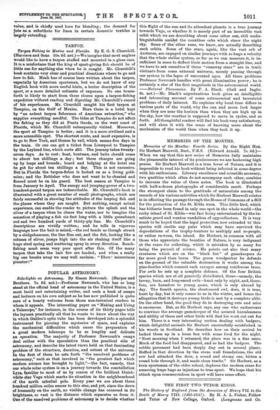MEMORIES OF THE MONTHS.
Memories of the Months Fourth Series. By the Right Hon. Sir Herbert Maxwell, Bart., F.R.S. (Edward Arnold. Is. 6.1.)— When we say that this new series of Memories fully maintains the pleasurable interest of its predecessors we are bestowing high praise. Sir Herbert Maxwell is a true lover of Nature, and it is impossible to read his book without being infected in some degree with his enthusiasm. Literary excellence and scientific accuracy, two qualities which often do not accompany each other, combine to increase the value of these notes. The book is illustrated with half-a-dozen photographs of considerable merit. Perhaps the strongest claim to the gratitude of naturalists among the records of his various activities which Sir Herbert Maxwell relates is in effecting the passage through the House of Commons of a Bill for the protection of the St. Kilda wren. This little bird, which has hitherto been found in only one spot in the whole world—the reeky island of St. Kilda—was fast being exterminated by the in- satiate greed and wanton vandalism of egg-collectors. It is very much to be hoped that the legal protection now extended to' this species will enable any pairs which may have survived the depredations of the trophy-hunters to multiply and re-people, or rather re-wren, the island. Sir Herbert, in common with all those who appreciate the beauties of Nature, is very indignant at the craze for collecting, which is mistaken by so many for being the pursuit of science. He points out also that many creatures which are on the "black list" of gamekeepers do far more good than harm. The green woodpecker he defends on the ground of the valuable destruction it works among the pine-beetles which commit such ravages among coniferous trees. For owls he sets up a complete defence. Of the four British species which are at all generally distributed, three—namely, the tawny, barn, and long-eared owls—hunt only by night, and, there- fore, are harmless to young game, which is only abroad by day. The fourth species, the short-eared owl, does, it is true, hunt by day, but it only comes to us in the winter, and hence the allegation that it destroys young birds is met by a complete alibi. On the other hand, the good they do in destroying rats and mice is enormous. But, as Sir Herbert says, any one who endeavours to convince the average gamekeeper of the assured harmlessness and utility of these and other birds will find his work cut out for him. There is a very interesting section dealing with badgers, which delightful animals Sir Herbert successfully established in his woods in Scotland. He describes how on their arrival he locked them up in a loose box with some food for the night. "Next morning when I returned, the place was in a fine mess. Much of the food had disappeared, and so had the badgers. The cobble pavement had been deeply dug out in several places. Baffled in that direction by the stone wall foundations, the old sow had attacked the door, a sound and strong one, bitten- a round hole through it, and made clean tracks." Sir Herbert, as a keen sportsman of the older school, deplores the modern craze for amassing huge bags as injurious to true sport. We hope that his attack upon commercialism in sport will have some effect:
















































 Previous page
Previous page